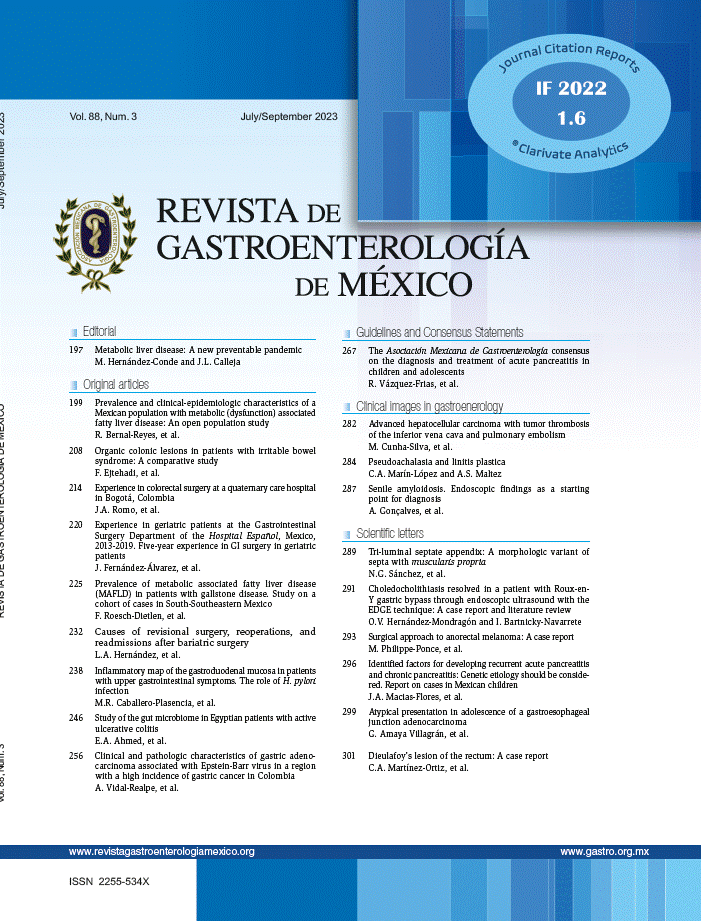We thank García-Mazcorro et al.1 for their interest and comments on our review.2 In relation to their first point, we completely agree with them concerning the term intestinal «flora». Microbiota is the correct word, defined as the community of living microorganisms residing in a determined ecological niche, and we use it, not only in the title, but throughout the article (79 times to be exact), whereas the less precise but commonly used flora is employed only 5 times.2
Secondly, the 16S ribosomal RNA (rRNA) gene is one of the components of the small subunit (30S) of the ribosome and is present in all bacteria and archaea. It is the genetic marker used in bacterial phylogenetic analysis and is widely used in an endless number of studies. This gene sequence is approximately 1,550bp long and is composed of 9 highly variable regions or hypervariable regions flanked by constant regions. The differences in sequencing of these hypervariable regions make it possible to taxonomically identify the bacteria present in study samples (for example, in stools and intestinal mucosa).3 The «rrs» gene, also known as 16S ribosomal DNA or 16S rDNA, as mentioned in table 3 of our article, encodes 16S rRNA. Even though there are limitations in sequencing based on 16S rRNA, it continues to be the gold standard due to the extensive databases based on this marker. Illumina belongs to the «next generation» sequencing technologies that are limited by the length of the sequences they can provide, and so specific regions of the 16S rRNA gene must be selected in the analysis.3 Other sequencing strategies and equipment currently exist that were designed for completion and correction.
Thirdly, the inability to absolutely establish the microbiota that is characteristic of IBS due to the factors mentioned by García-Mazcorro et al. is a fundamental aspect of our review.2 In fact, that was why we reached the conclusion that even though there is evidence that the intestinal microbiota is different in persons with IBS from that of normal subjects (level 3b evidence, grade B recommendation), it is not possible to establish a microbial composition that is specific for this disorder (level 3b evidence, grade B recommendation).2
On the other hand, we agree that the taxonomic levels found were not mentioned in some cases, but some of the studies reviewed only reported the differences in microbial groups. And finally, we agree that our already extensive review fell short of analyzing the use of probiotics, prebiotics, and even synbiotics, in the treatment of IBS, but we felt these topics should be the subject of another review. As a matter of fact, a very recent systematic review of the literature has reported that probiotics were superior to placebo due to a lower frequency of IBS symptom persistence (55.8% vs. 73.1%).4 In addition, probiotics were shown to be superior to placebo in the improvement of overall symptoms, abdominal pain, subjective abdominal bloating, and flatulence. Specifically, it was Bifidobacterium spp that showed a tendency toward the improvement of overall symptoms and abdominal pain, but determining which strain(s) will be the effective one(s) has yet to be established. The authors also found that there were very few studies on prebiotics and synbiotics.4 Another review found that B. infantis 35624 was effective in improving subjective bloating in IBS in general and B. animalis DN-173 010 in patients with constipation predominant IBS (IBS-C).5 Furthermore, the relation between diet and the microbiota should also be analyzed. For example, low FODMAP (Fermentable Oligosaccharides Disaccharides, Monosaccharides, And Polyols) diets that improve IBS symptoms also appear to reduce the concentration and proportion of bifidobacteria in stools determined through fluorescence in situ hybridization.6
Financial disclosureThe document «Microbiota, gastrointestinal infections, low-grade inflammation, and antibiotic therapy in irritable bowel syndrome (IBS): an evidence-based review» was made possible thanks to funding from Alfa-Wassermann. All the authors received an honorarium for their participation.
Conflict of interestMax Schmulson has been a consultant for Procter and Gamble, Novartis, Schering-Plough, Alfa-Wassermann, Janssen, Nestle Ltd, and Almirall. He has been a speaker for Takeda México SA de CV, Schering-Plough, Mayoli-Spindler, Alfa-Wassermann, Janssen, and Novartis. He has received research funding from Alfa-Wassermann, Nestle Ltd, and Takeda México SA de CV.
María Victoria Bielsa has been a consultant for Alfa-Wassermann, Takeda México SA de CV, and Astra Zeneca. She has been a speaker for Takeda México SA de CV, GlaxoSmithKline México, Mayoli-Spindler, and Alfa-Wassermann.
Ramón Carmona-Sánchez is a member of the Advisory Counsel of Takeda Pharmaceuticals, Alfa-Wassermann, and Mayoly-Spindler. He has been a speaker for Nycomed-Takeda, Mayoly-Spindler, Asofarma, and Janssen-Cilag.
Angélica Hernández has been a consultant for Alfa-Wassermann, Astra Zeneca and a speaker for Astra Zeneca, Menarini, Boston Scientific, Olympus, and Ferring.
Aurelio López-Colombo has been a consultant for Novartis and a speaker for Takeda, Alfa Wassermann, Janssen, and Novartis.
Yolanda López-Vidal has been a consultant for Alfa Wassermann and she has received research funding from and been a speaker for Nestlé Ltd.
Mario Peláez-Luna has no conflict of interest to declare.
José María Remes-Troche is a member of the Advisory Counsel of Takeda Pharmaceuticals, Alfa-Wassermann, Almirall, and Janssen. He has been a speaker for Nycomed-Takeda, Advance Medical, Endomedica, Astra-Zeneca, and Bristol-Myers-Squibb. He has received research funding from Sanofi-Pasteur, Asofarma, and Astra Zeneca.
José Luis Tamayo is a member of the Advisory Counsel of Alfa-Wassermann, Malloly-Spindler, and Takeda. He has been a speaker for Astra Zeneca, Malloly-Spindler, Janssen, and Takeda Pharmaceuticals.
Miguel A. Valdovinos has been a member of the Advisory Counsels of Takeda, Malloly-Spindler, Almirall, Sanofi, and Danone. He has been a speaker for Takeda, Almirall, Merck, Almirall, Ferrer, Janssen, Endomédica, Novartis, and Danone and has received research support from Endostim Inc, Ferrer, and Danone.
Please cite this article as: Schmulson M, Bielsa MV, Carmona-Sánchez R, Hernández A, López-Colombo A, López Vidal Y, et al. Microbiota gastrointestinal y síndrome de intestino irritable. Respuesta a García-Mazcorro. Revista de Gastroenterología de México. 2014;79:215–216.



